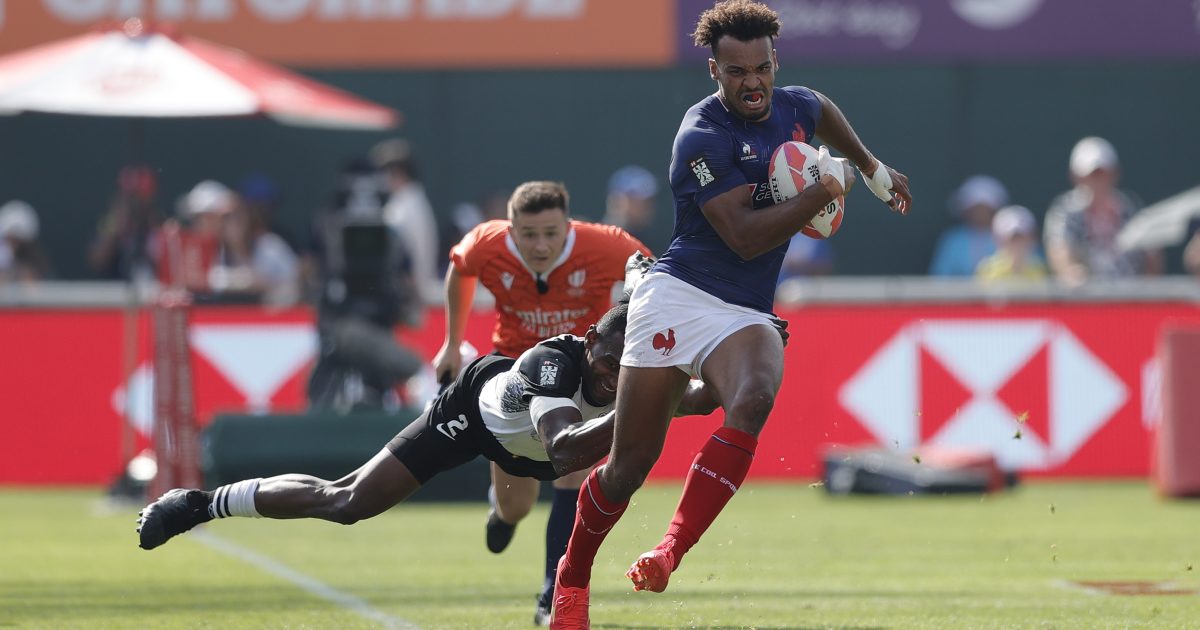France 7 masculin au Cap : le guide complet

Le HSBC SVNS Cape Town 2024 sera le 23e tournoi du circuit mondial à se tenir en Afrique du Sud où plusieurs lieux ont déjà servi de décor : Stellenbosch, Durban, George et Port Elizabeth étaient les localisations avant que la caravane ne débarque à Cape Town il y a sept saisons de cela.
C’est la Nouvelle-Zélande qui détient le record de titres remportés ici (11) après avoir participé à 18 des 22 finales en Afrique du Sud. Mais la dernière équipe à l’avoir emporté, ce sont les Samoa en 2022.
Et la France dans tout ça ? Elle fait partie des huit pays qui ont disputé une finale de Cup, mais ne l’a jamais remporté. La seule et unique fois que les Français étaient en finale, c’était en 2012 et le tournoi se tenait à Port Elizabeth. La France s’était inclinée 47-12 face à la Nouvelle-Zélande. Deux fois elle a fini avec le bronze, en 2015 et 2020. En 2020, la France avait d’ailleurs fini en tête de sa poule.
Redresser la barre
Contrairement aux filles, les hommes du coach Jérôme Daret n’ont pas bien lancé leur campagne en terminant à la 9e place à Dubaï après leur meilleure saison la saison dernière qui les avait vu finir 4e du classement général. C’est la deuxième fois au cours des trois dernières saisons qu’ils sont placés aussi bas après le tournoi d’ouverture.
Pourtant, le bilan statistique de la France n’est pas mauvais avec 80% de réussite dans la zone rouge des adversaires – soit 16 essais en 20 entrées dans les 22 – soit le troisième taux le plus élevé de toutes les équipes. Leur principale source d’essais a été la relance rapide (38%).
Malgré le plus faible taux de réussite aux plaquages (66%) les Français ont récupéré le plus de ballons (7) que n’importe quelle équipe à Dubaï.
Contre les Fidji
La France va donc vouloir se relancer après sa plus lourde défaite sur le circuit mondial en cinq ans face aux Fidji (40-5 à Dubaï). Ils n’ont jamais perdu deux matchs de suite contre les Fidji avec un écart de plus de 35 points depuis le passage du circuit à Dubaï et Cape Town en 2019.
C’est précisément ce match qui leur a coûté cher pour la suite de l’étape aux Emirats Arabes Unis. Les Français n’ont réussi que 60% de leurs plaquages face à l’insaisissable Terio Tamani (trois essais) et ses coéquipiers, encaissant six essais dans leurs propres 22.
Contre l’Argentine
Ce deuxième match de la poule B ne sera pas plus facile car les Français n’ont plus battu l’Argentine depuis Dubaï la saison dernière. Ils feront donc tout pour éviter une quatrième défaite de suite contre los Pumas 7s ; ce qui s’était déjà produit lors de la saison 2008-2009.
Contre l’Espagne
La dernière rencontre de la poule devrait être plus abordable car jamais les Espagnols n’ont réussi à battre les Français lors des quinze dernières rencontres, depuis les séries 2018. Le mieux était un match nul.
Souvent menés à la pause, les Français ont su revenir au score à quatre occasions durant cette période, jusqu’à marquer un total de 64 points (à 31) la saison dernière.
Le joueur à suivre
Stephen Parez-Edo Martin a volé le plus de ballons (4) que n’importe quel autre joueur lors du week-end à Dubaï. Et il se pourrait qu’au Cap il devienne le troisième joueur français à passer la barre des cent essais sur le circuit, s’il en vient à marquer trois de plus dans le week-end pour son 71e tournoi. Avant lui, Terry Bouhraoua (131) et Julien Candelon (114) sont déjà passés par là.
L’EQUIPE
- Jonathan Laugel, 30 ans – 90 tournois
- Stephen Parez-Edo, 29 ans – 70 tournois
- Paulin Riva, 29 ans (capitaine) – 41 tournois
- Antoine Zeghdar, 24 ans – 11 tournois
- Aaron Grandidier-Nkanang, 23 ans – 14 tournois
- Joachim Trouabal, 23 ans – 12 tournois
- Jordan Sepho, 24 ans, 18 tournois
- Varian Pasquet, 24 ans – 18 tournois
- Rayan Rebbadj, 24 ans – 13 tournois
- Jefferson Lee Joseph, 21 ans – 8 tournois
- Andy Timo, 19 ans – 4 tournois
- William Iraguha, 26 ans – 24 tournois
- Paul Leraître, 22 ans – 9 tournois
Les matchs du samedi 9 décembre (heure française)
- Fidji v France 7 Masculin – 09h28
- Argentine v France 7 Masculin – 12h34
- France 7 Masculin v Espagne – 17h34











































